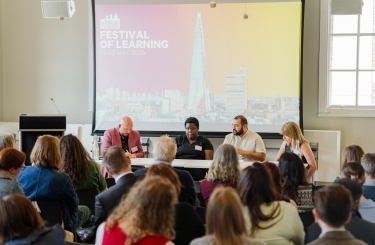Related



What key ingredients do you need to create systemic change? How do you develop a common understanding of what it means to change a particular system? How do you measure the success of the work? Do you need to?
As part of our learning programme on systemic change, we spoke with Naomi Diamond and Leigh Brown from Collaborate CIC about all of these questions and more, based primarily on their experience of being a learning partner for the Cornerstone Fund (a collaboration between London Funders’ members City Bridge Foundation, the National Lottery Community Fund, Trust for London, John Lyon’s Charity and the Greater London Authority).
The Cornerstone Fund builds and progresses the ambitions of the ‘Way Ahead’, a joint initiative by civil society, public sector bodies and funders, coordinated by London Funders back in 2016. The Way Ahead initiative set out a vision for a thriving civil society that is resilient, collaborative, and sustainable and which will improve outcomes for Londoners. Eight years on from the publication of the Way Ahead recommendations, there is much to learn from how Cornerstone Fund partners have ambitions of systemic change into practice. With their role as a learning partner to the Fund coming to an end, Naomi and Leigh reflected on the learning that’s emerged.
Naomi: The Cornerstone Fund brought together nine funding organisations. The aim was to fund partnership approaches led by civil society organisations to bring about systems change and achieve better outcomes and resilience for Londoners. Funders were particularly interested in testing new ways of funding, but we’ve also seen the funded partnerships increasingly interested in broad systems change in public services, the media and the wider funding world. So, it’s been interesting that they haven’t wanted to set boundaries for the kind of systems change they want to see.
Let's face it, nobody really knows how to do systems change. There's not a blueprint, there's not one model.
What we’ve also seen is the role infrastructure organisations play in systems change, particularly as facilitators and conveners of different sectors. One of the key learning points is how the flexibility of the Fund enabled so much experimentation and learning, because let’s face it, nobody really knows how to do systems change – there’s not a blueprint or any one model. The funded partnerships really valued the flexibility that was offered by the Fund and the ability to try out different things without the pressure of delivering specific outcomes.
Leigh: This was also not just a programme of funded partnerships, but it was also a partnership of funders so there was learning at different levels: firstly at the level of the partnerships working to advance systems change but also the work of funders and how they’ve approached funding systems change and aligning their practices.
Naomi: It's true that systems change can feel really abstract, especially for people at the sharp end who are dealing with very immediate day-to-day issues in their organisations and in their lives. But equally, everybody always talks about how we need to stop just dealing with the symptoms and we need to get to the roots. When you listen to people talk about that, they're talking about systems change but they wouldn't necessarily use that kind of language.
And for us, it's really important that the people leading the systems change work defines what it means to them, rather than it being defined by funders because funders are often very removed from the problems that are being tackled.
The Cornerstone partnerships have continually grappled with the language of systems change and they've talked about how they've tried to make it real for the groups that they're working with but in many cases, they don't use the language of systems change. They try to find other ways to talk about what they're trying to do. We felt as a learning partner to the Cornerstone Fund it would be useful to have some common language and ways of seeing progress towards systems change, at least within the Fund.
So, at the beginning of the first round of funding, we developed quite a simple framework which came from funded partnerships saying ‘this is what systems change means to us and these are the things we need to change’. The framework covers five main pillars, which we call the ‘foundations for systems change’:
More information about the five foundations for systems change is available here.
It's really important that the people leading the systems change work define what it means to them.
Leigh: To add to that, not only have the partnerships within the Cornerstone Fund grappled with the language of systems change but also how they define the boundaries of the system that they're trying to change and how they situate themselves within it. So, it’s not just a challenge developing language that’s accessible and shared but also in how they understand the system in terms of drawing the boundary for the sake of being able to contain it, so it doesn’t get too abstract or something ‘out there’.
Leigh: I think we should be specific. The biggest risk is when it becomes so abstract that it loses any reference to anything tangible. Something we’ve taken from the work Collaborate has supported is looking at what shifts we want to see across a particular system – like moving from siloed ways of working to more collaborative approaches for example (you can read more about the ‘Four Shifts’ analytical framework we’ve used in other work here).
No system change will happen through the efforts of one single organisation.
Naomi: I don’t think it’s about having just one definition because it’s too complex, but it’s helpful to define or agree on some core principles to guide funding that’s intended for systems change. What characterises systems change work is that it must involve a collective of actors because no system change will happen through the efforts of one single organisation. Any funding for systems change work needs to be about funding collective efforts and not just individual interventions. Then there’s something about acknowledging that it's long-term work and even if you’re funding just a short-term bit, you need to see the work in a broader time frame and be mindful of what happens after your funding is finished.
Systems change is about saying there’s a different way of doing things and we’re going to model it, test it and create it.
Naomi: In addition to the collaborative point I mentioned above, I think the most important thing is to see this work as long-term. You don’t fund two-year systems change projects, or at least not without a plan for what happens afterwards. So having the patience to understand how much time it takes to build relationships and trust is really important.
The other point is the importance of recognising the burden on the individuals who are involved in systems change work. There is a lot of burnout that happens so funders considering wellbeing and resilience budgets as part of their funding for systems change feels really important.
With systems change work, funders have recognised that they need to take a step back and have a lot of trust but sometimes the impact of that is that they almost appear not to care about the work. Funders aren’t just providers of money and resources, they also have power, they have access to decision-makers and have this kind of helicopter view of what’s going on in the area they fund – that’s really important to systems change work.
My final point is thinking through how you sustain funder collaborations – it takes commitment, resources, having somebody leading the collaboration, somebody facilitating the learning and convening – so that’s really important to consider.
Leigh: I’d echo that. Not only is there the burden of trying to change the system but when you’re directly impacted by that system, there’s an emotional impact, so funders need to be accommodating of that and recognise that people will have different ways of working.
Naomi: Our role was very much as a learning partner, not an evaluator. We were not asked to measure impact but to help the partnerships and the Fund as a whole reflect and recognise the progress towards systems change. We didn’t develop any kind of indicators or measures but it is definitely possible to do that. Saying that, we have to be really careful about taking complex change processes and simplifying them into sets of quantitative indicators.
Ultimately, we should all be more interested in learning about what’s going well and what’s going well so we can keep improving the work. That’s more important than being able to measure some sort of rate of change and that point really speaks to being able to have those radically honest conversations between funders and grantees.
Leigh: Systems change work is also not static, it’s always going to change. If funders or practitioners are approaching it as though it is static, then it is not going to have the same impact.
You can read more about the learning from the Cornerstone Fund on Collaborate's website here and and on City Bridge Foundation’s website: The Cornerstone Fund.


